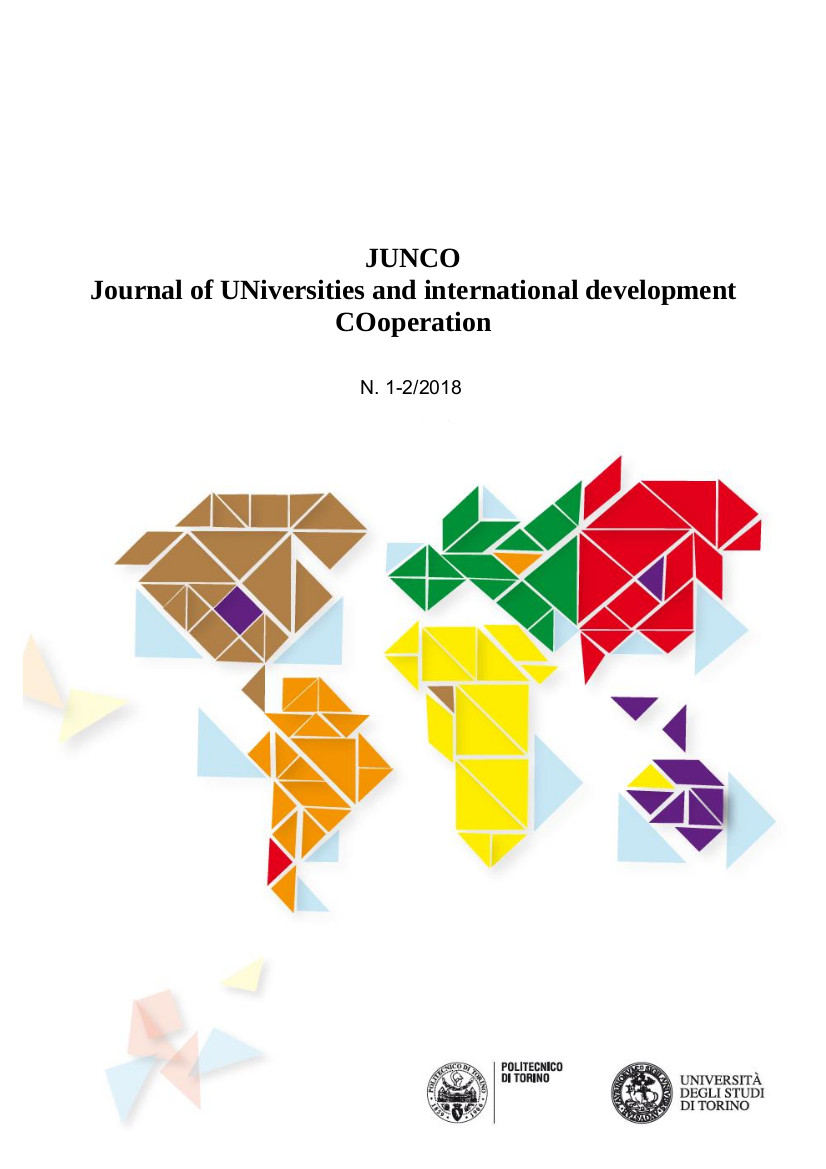Professional changes and new challenges in the field of international aid. The case of a professional master on educational inclusion
Abstract
The international scenario seems today characterized by an increasingly level of tensions and widespread conflicts, some of which have taken the shape of real humanitarian emergencies, especially the war in Syria, among the worst in the last decades.
Global political change and cultural transformations across the world occur at many levels.
On the one hand, national borders and social boundaries are increasingly blurred and constantly (re)drawn as result of the civil wars and massive migration flows. To this regard, the increase in the number of asylum-seekers in EU Member States over the past two decades has became deeply connected with the rise of exclusionary forms of ethnocentrism and populism.
On the other hand, the terrorist movements and the political instability in both the Middle East and African countries have made more difficult for vulnerable people achieve inclusion and peace. Growing forms of inequality, generated by a globalization process, have often neglected a fragile balance between the local and global processes, especially in the poorest countries, informing the conservative trends of many Western democracies.
The global changing scenario have forced the humanitarian and aid organizations to frame new agendas and re-think the traditional approaches in pursuing stability and promoting inclusion around the world. Indeed, there is an urgent need for professional changes in the way the international community face humanitarian crisis and violations of human rights.
Engaged with this issue, Italy finds itself in the strategic position to overcome the inadequacy of European responses to the making of development policies as well as solutions facing the growing arrival of refugees and migrants crossing the European borders. To this regard, the new Italian Law 125/2014 can be seen as part of a broader international policy, which resists and contrasts the new populism that animates Europe, supporting inclusive policies.
The Italian Agency for Development Cooperation, even if still processing its model, finds a crucial opportunity to build a renewed approach of cooperation where the Italian universities, among the other institutions, can make their contribution in the field of development and humanitarian aid, opening the “Third Mission” to a development-oriented international effort, as the United Nations Agenda 2030 states.
The University of Bologna 2016-2018 Strategic Plan has included the international cooperation actions under the Third Mission, placing them within the Goal 17 of Agenda 2030, that is to strengthen “the means of implementation” and renew the global partnership for sustainable development.
In order to achieve these goals, the Department of Education Sciences aims both to become increasingly involved in the internationalcooperation projects(such as, Latin America, Africa and the Middle East) and to promote the training activities addressed to the experts engaging with the educational issues.
Within this background, the paper aims to introduce the training experience of a new Professional Master – which was planned thanks to a past successful experience - in order to discuss the new challenges that these professionals have to face in the changing global scenario.
If, on the one hand, the educational dimension includes a wider social function, becoming strategic to all the actions aimed at pursuing human development, on the other hand, the interweaving of the above-mentioned processes makes more difficult the negotiation of shared meanings to which the professionals refer to practice in the field. Among the other, we can observe the difficulty to link emergency humanitarian action to a more organic frame of development interventions. In socio-educational sector, in particular, this tension between emergency and development could fall into naive assistentialism, “paternalistic” attitudes, or takes the shape of an explicit or implicit “cultural colonialism” informing the international interventions.
Within this frame, the Professional Master "International Cooperation and educational inclusion: new professional challenges” will address its effort in training new professional profiles engaged with the humanitarian aid and international development fields as well as a wide range of multicultural reception policies (at the local and national level) towards migrants, children of foreign origins, refugees and asylum seekers.
For this reason, the Department has decided to link the training experience to a research activities aimed at explore more in depth the skills and methodologies addressed to such specific professional profile.
Complementing the Master, the empirical research will aim, firstly, to collect interviews with some privilege witnesses. In particular, people involved will be practitioners, experts, project managers from non-governmental organizations, international organizations multilateral and bilateral agencies, non-profit associations, social cooperatives, local or national agencies committed to contrast socio-educational marginality as well as to the governance of migration and forced migration.
Moreover, the research will also be a way to monitor the developing of the Professional Master, showing lights and shadows of this post-graduate experiences.
Finally, it will understand if and how the training activities, and their inter-disciplinary background on the topic pf educational inclusion - from pedagogical issues to socio-anthropological knowledges - are in line with the complexity of the contexts where the students shall work in the future.
Thanks to the contribution of the main Italian institutional actors, such as the Ministry of Foreign Affairs and the AICS, both the research and the Master can be seen as a significant arena to strengthen the synergy between the practical and the theoretical-political dimension of the international cooperation, providing to the universities a leading role in training new professionals in such field.
For this reason, the Department has decided to link the training experience to a research activities aimed at explore more in depth the skills and methodologies addressed to such specific professional profile.
Complementing the Master, the empirical research will aim, firstly, to collect interviews with some privilege witnesses. In particular, people involved will be practitioners, experts, project managers from non-governmental organizations, international organizations multilateral and bilateral agencies, non-profit associations, social cooperatives, local or national agencies committed to contrast socio-educational marginality as well as to the governance of migration and forced migration.


